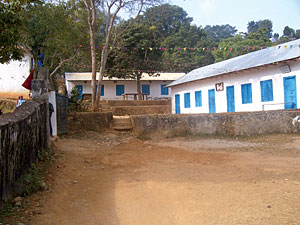 |
In recent years, the government has instituted a series of education reforms that aim to make schools more responsive to the needs of individual students. However, there are signs that this policy shift, detailed in the School Sector Reform Plan of 2009, may be frustrated by the persistent problems of large class sizes and inadequate teacher training.
Two key policies the government has warmed to are the Liberal Promotion Policy (LPP) and the Continuous Assessment system (CAS), which relax promotion requirements while assessing students more regularly throughout the school year. The point is to reduce dropout rates, ensure that all students keep up with the syllabus, and lessen the immense psychological pressure that attends the conventional examination system.
"Many students who fail during the early years of schooling never return to school. These policies will help to check that trend," says educationalist Tirtha Khaniya of the National Planning Commission.
Variants of these policies are practiced widely in the west and have shown impressive gains in southeast Asia with regards to access to and quality of education. In Nepal, LPP has been in operation for several years from Classes 1-3, and was recently extended up to Class 7. While it may be too early for a conclusive judgment, the early signs aren't all positive.
"Access to education has improved but the impact on the quality of education in the lower classes has been mixed," says educationalist Mana Prasad Wagley, Dean of the Kathmandu University School of Education.
At Shree Janakalyan Higher Secondary School in Hungi, Palpa, it's clear why this may be so. The school has over 1000 students but only 11 classrooms, which means about 100 students must be packed into classrooms designed to seat only 30. Under these circumstances, the kind of individual student attention that LPP and CAS demand is next to impossible.
English teacher Drowna Raj Nyoupane complains, "I can't interact with my students and supervise what they are doing, so I don't even know if they are learning anything. With over 100 students in a class, what can I do?"
Additionally, teachers haven't been adequately trained about the proper implementation of these policies. As a result, many teachers have misinterpreted them as an outright prohibition on failing students.
"Too many teachers think the policy means you can't fail anyone. But, that just isn't the case," says Wagley.?
This, along with large class size, has led to cascading problems. Some students are less motivated to study, and the classroom environment has deteriorated as the higher pass rate has raised the student retention rate and subsequently class sizes. Teaching has also grown more difficult as classes have filled up with students of varying skill-levels, since they are passed regardless of their exam scores.
The consequences have been felt outside of Hungi too. In 2004, a study on CAS by the Department of Education found that schools with CAS performed worse than those without, and concluded that the policy had failed.
"This is the most absurd result I've ever seen," erupts Wagley, "these aren't bad policies, they have just been poorly implemented."
Absurd or not, it isn't a surprise. There have been problems with teacher training and supervision for a long time. In the 1990s, two donor-funded programs worked separately to revise the academic curriculum and improve teaching practices. But the teachers weren't trained about the curricular changes, so the programs couldn't be implemented properly.
"It reflects a broader point: although everyone knows what's necessary for education reform, not many are clear about what's sufficient, like teaching teachers how to deal with children," concludes Khaniya.
Until these extra investments are made, the future of school children like those in Hungi hangs in the balance.
If you would like to make a contribution to Shree Janakalyan Higher Secondary School, contact Janak Raj Pandey at [email protected]


